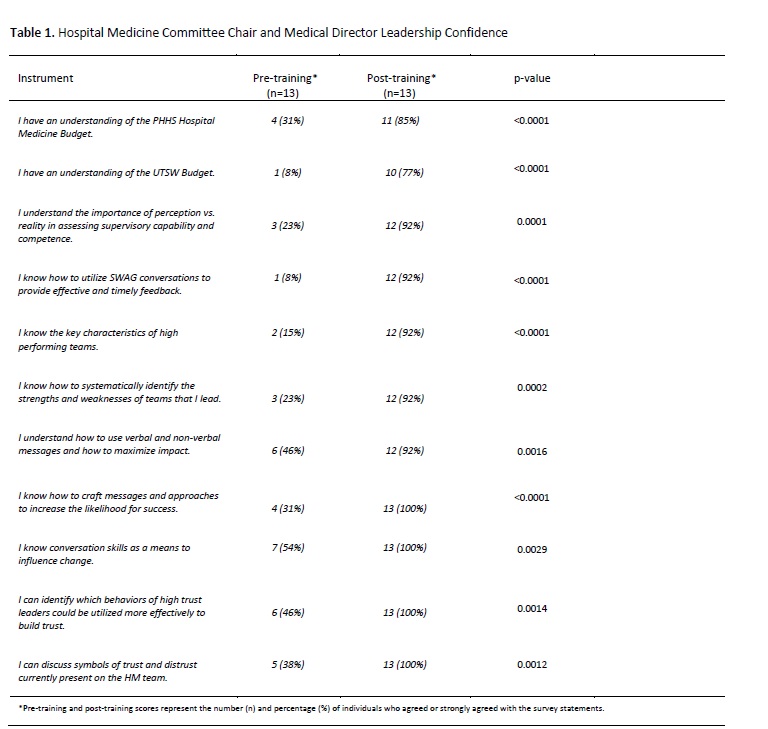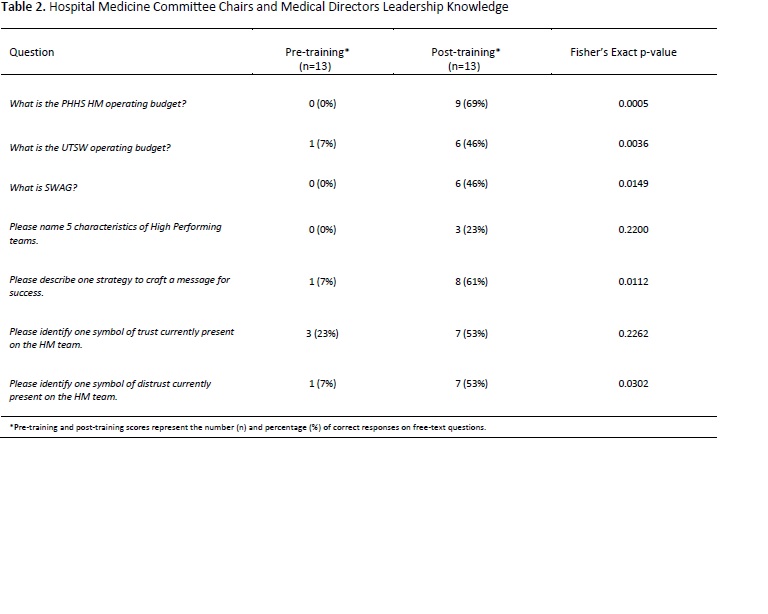Background: Large hospital medicine groups of 30 or more physicians comprise over 20% of practices (SHM 2018). Our academic hospital medicine service is comprised of 65 faculty members. We recognized a need for multiple levels of leadership beyond the immediate chief and director of clinical operations. Our team, like most hospital medicine groups, is comprised primarily of early career physicians who had minimal leadership training in residency (Fraser et al 2015).
Purpose: In 2018, we implemented a shared governance practice model with 9 committees composed of 8-10 hospitalists and 1 chair, forming the foundation of the model. 1 of 3 medical directors guide each chair and the division chief guides the 3 medical directors. The majority of our chairs and directors are junior faculty with little leadership experience and no formal leadership training. We recognized the need for a quick infusion of leadership skills and knowledge. Accordingly, we conducted a one day leadership retreat to catalyze the leadership acumen of our foundational and emerging leaders.
Description: Retreat content included an introduction to the concept of leadership, review of divisional and health systems finances, the essentials of supervision, problem-solving, high-performance teamwork, effective communication and influence, trust in leadership and wellness. Key points for the retreat included the general leadership principles of values-based leadership and achieving results through others. For finances, our administrative lead reviewed the 2019 fiscal year divisional and health system’s budget. Key points of supervision included a review of non-verbal communication tools , a SWAG (State, Wait, Ask, Gain) exercise and content on leading with authenticity. High performance teamwork domains reviewed included relationship building, leadership styles, role clarity, working and thinking processes and structured communication tools. A deeper dive into communication included differentiating spontaneous and planned communication, utilizing the PAR (Problem, Action, Results) tool, first impressions and rapport building. Another theme the retreat delved into deeply was trust. Each participant received a copy of The Speed of Trust. A session based in the principles outlined in the book was delivered, including behaviors of high trust persons, showing integrity, intent, capability and results, creating transparency and practicing accountability. We administered pre and post surveys to retreat attendees to determine if the retreat improved our leaders’ perceived comfort in the various leadership domains covered as well as whether they gained specific knowledge. The survey consisted of both questions examining confidence in different leadership skills and knowledge as well as a testing of knowledge points made during the retreat. We found that attendees had a low level of baseline knowledge and comfort in all domains of leadership covered in the retreat. All attendees experienced a significant increase in confidence in and knowledge about leadership. (Tables 1 & 2).
Conclusions: All hospital medicine groups and perhaps large groups, in particular, need to develop leaders on multiple levels for both the successful functioning of the group as well as for succession planning. A one, day, intensive leadership retreat successfully catalyzed and cultivated the leadership skills and qualities of the foundational (committee chairs) and emerging (medical directors) leaders of the UTSW Division of Hospital Medicine at Parkland.


